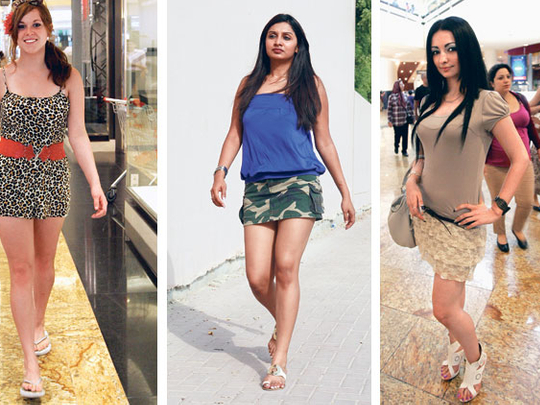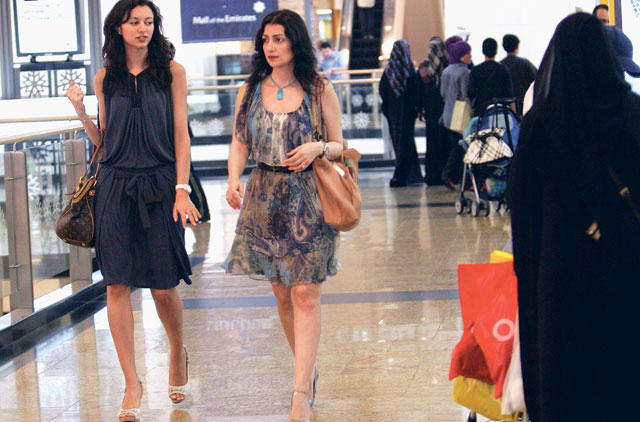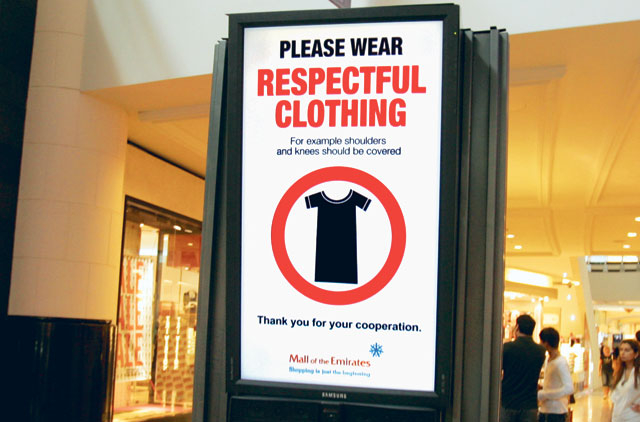
Dubai : When Maria Hilton, 18, flew to Dubai from Canada she thought she'd have a fair bit of covering up to do.
Being an Arab city, the laws would be strict here, she assumed.
Three weeks into her holiday, Hilton is shopping at the Mall of the Emirates. In blatant disregard of the mall's dress code policy, she's wearing a short striking leopard-print jumpsuit with spaghetti straps.
And she's not alone.
Signboards urging women to "please wear respectful clothing" are conveniently overlooked by many others too as are similar messages flashed on LCD screens.
Unlike Sharjah, with its stringent laws about what not to wear, Dubai is lenient. Unless one were to walk around in their underclothes or less, there would be no arrests or fines. Laws about the dress code are vague.
As a result malls tread a fine line on what's considered ‘appropriate'. Interpretations vary.
Interpretations vary
According to a Mall of the Emirates spokesperson, respectful clothing amounts to knees and shoulders being covered.
Sabina Khandwani, Head of PR and Marketing, BurJuman, says: "We can't specify what respectful is, since Dubai doesn't have any laws on this."
The natural assumption, she says, would be for people to cover up and not wear anything transparent. "The word ‘respectable' is up for debate. The idea is to make women understand that they shouldn't offend the sensibilities of shoppers around them. This is after all an Islamic environment."
"When I first planned a holiday in Dubai, I reckoned I'd have to dress differently," says Hilton. "I landed here with a bagful of trousers, jeans and modest T-shirts. A couple of days into the trip, I went to Dubai Mall. Looking at the women in minis and shorts prompted me to dress the way I would back home in Calgary."
Dressed to kill, Hilton attracts instant attention. "I'm slightly uncomfortable with the way some Arab women look at me, but I figure that as long as I'm not breaking any laws, no one can say anything to me."
She is probably right. "As a mall, we can't tell women not to wear shorts. But shorts and skirts have lengths and fits that vary… how do we draw the line, and where?" says Khandwani.
Last year several teenagers were detained in Ras Al Khaimah for indecent exposure and, more recently, a European shopper in BurJuman was requested to cover up her peek-a-boo outfit with a shawl.
Sharon Alvares, a Dubai-based PR manager said: "If security had to approach me at a mall and ask me to cover up, I'd probably do so."
On weekends and after-work hours, Alvares wears shorts and skirts. "I am comfortable in them and I'm not breaking any laws or hurting anyone's sensibilities."
"I can't believe certain malls are flashing signs asking women to cover their knees and shoulders. With temperatures nearing 50 degrees, it's too hot to wear too much," says the 26-year-old.
Has the leggy brunette ever been asked to tone down her style? "At nightclubs people pass remarks sometimes, but nothing too intruding," says Alvares.
"What I find intriguing is that along with male attention, I also generate a lot of negative female attention. That makes me very uncomfortable."
Would that persuade her to wear trousers instead? "Not really. Why should I cover up for their sake? I am not violating any law."
Such attitudes certainly don't go down well with everyone. Saima Jaffar, a Pakistani mother of two, says she's often embarrassed when she sees what some women wear. "I can only imagine what is going through the minds of all the men in the mall. Or worse, the effect it has on children. I would hate for my children to think that semi-nude is the norm."
Mariam Yasin, an American-Palestinian residing in Dubai, agrees with the logic behind covering up. "In the US it may be acceptable to go to the mall in a bikini and a revealing cover-up. But Dubai is more conservative and we should respect the cultural values here."
Holistic practitioner Yasin believes in dressing venue-appropriate.
"If I'm going to a party or the beach then the circumstances are different. At a mall, I'll wear a dress, but I'll make sure that it doesn't offend anyone."
Venera Biktimerova, a 20-year-old tourist from Russia, who is considering making Dubai her home, is not ready to compromise. "I've always known this is an Arab country and women are supposed to cover up. But I'm not afraid. The law doesn't ask all women to wear long dresses. I'll wear exactly what I want to wear. No one has the right to ask me to change the way I dress," she says.
Not even mall rules? "The malls say one should be dressed respectfully. For me, what I'm wearing is respectful. I'd say the definition of respectable clothing is clothes that fit you well and make you look attractive. And short skirts and dresses make me look attractive. You'd never catch me in a pair of trousers or jeans. I'll leave those for the other women."
No legal clarity
With no legal clarity on a dress code, the debate over respectable attire rages on. "Legally, we can't walk up to a woman in the mall and tell her that her shorts are too short. When there is no legal restriction on attire, all we can do is put across recommendations," says Khandwani.
So why then do malls sell hot pants, micro minis, tube tops…?
"We sell underwear too," she says. "But we don't expect people to wear nothing over it. It's the same deal with everything else. Buy a revealing top, but pair it with a wrap. Buy micro-minis and wear them with leggings."
"The number of women I see exposing themselves is astounding," says Jordanian Rasha Habib. "Why can't people understand that this is an Arab country? In which country would it be considered decent for a woman to flash her assets in front of other women's husbands, fathers and children? When I see women who shame our gender, I often go to security and complain. Sometimes the women understand and leave the mall. Other times they fight back."
Taking the middle ground is Lebanese expat Abeer Ayash. "As long as my clothes show my personality, without making me feel over- or under-exposed, I'd be balanced out and, therefore, feel beautiful and classy and that's the image I will subconsciously project," she says.
"I've seen women covered from head to toe and yet they attract more attention than a girl in a dress that ends well above her knees."
According to Khandwani, the majority of people who violate the dress code in the mall tend to be Russians and British. "Occasionally, we have problems with the Spanish, and certainly with the South Americans, but other than that, it's hard to generalise."
Interestingly, the French, Germans and Italians rank amongst the most decently dressed Europeans in the mall, according to her.














